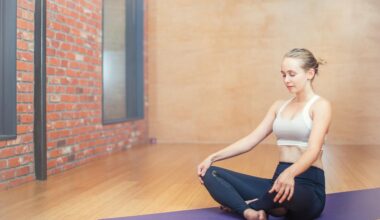The Truth Behind Home Workouts And Mental Health Benefits
When considering home workouts, many myths can cloud understanding of their benefits. One common myth suggests that home workouts lack effectiveness compared to gym routines. In reality, the efficacy of a home workout depends largely on the user’s commitment, creativity, and consistency. With the right home workout program, individuals can achieve fitness levels comparable to those attained at a gym. Moreover, many online platforms offer a variety of routines that cater to every fitness level, focusing on strength, endurance, and flexibility. Access to online classes enhances motivation and engagement, helping individuals stay committed to their fitness goals. Ultimately, the key to success lies not in the location but in the effort invested in each workout session. Home workouts can be just as effective if designed thoughtfully. They also provide flexibility that many individuals find appealing. Designing your home workout plan allows you to focus on personal goals and preferences. Therefore, staying informed and debunking myths associated with home workouts is crucial to understanding their pivotal role in overall mental health and wellbeing.
Emotional Wellbeing and Exercise
Engaging in regular exercise offers substantial emotional health benefits, particularly through home workouts. Exercise stimulates the release of endorphins, often termed ‘feel-good’ hormones. These endorphins significantly elevate mood and enhance feelings of happiness and relaxation. While some might believe that effective workouts only happen in the gym, home workouts are equally capable of producing this positive emotional impact. By incorporating family members or friends into your routine, you can further enrich this experience. Activities such as family yoga sessions or group workout challenges foster social engagement, crucial for emotional wellbeing. Additionally, home workouts offer the freedom to choose exercises that resonate personally, making it easier to integrate physical activity into daily life. This inclusivity promotes regular participation, thus sustaining the benefits of exercise. Importantly, when exercise routines reflect personal preferences, it significantly boosts motivation and commitment. Therefore, the emotional benefits derived from home workouts should not be overlooked. Creating an exercise-friendly environment at home can further enhance these benefits, reinforcing the connection between physical activity and improved mental health. Individual experiences may vary, but embracing home workouts can lead to remarkable benefits.
Another critical myth surrounding home workouts is the assumption that they cannot provide adequate challenges. Contrary to this belief, home workouts can be designed with varying intensity levels, suitable for all fitness capabilities. Equipment designs, ranging from resistance bands to weights, can greatly enhance the effectiveness of home exercises. For those looking to intensify their sessions, incorporating interval training is an excellent approach; it significantly improves cardiovascular fitness and burns calories more effectively. Meanwhile, bodyweight exercises also remain an effective, challenging method for those without equipment access. Workouts such as push-ups, squats, and lunges can be modified to increase difficulty levels. Additionally, numerous fitness apps provide guided workouts adaptable to individual needs. Progress tracking should be embraced actively, creating a visible representation of improvements over time. Setting and adjusting goals can keep motivation high while debunking the myths around home workout effectiveness. Therefore, home workouts can indeed provide a significant challenge. Rather than reaching for gym-based validations, understanding personal achievements and adapting workout routines can offer the desirable intensity that many seek.
Convenience as a Motivation
One must also recognize the convenience home workouts offer regarding mental health outcomes. The flexibility of exercising at home eliminates logistical challenges like commuting to a gym, and this time savings translates into extra time for other activities. This convenience becomes an essential motivator, especially for those leading busy lives who might struggle to find consistent times for workouts. Furthermore, engaging in home workouts can establish a rhythmic routine, positively impacting emotional resilience and stress management. Setting aside time to exercise encourages discipline that can permeate other areas of life, including work and personal goals. With regular home workouts, the body becomes accustomed to movement, contributing to the formation of a holistic lifestyle approach. Creating a designated workout space at home can reinforce this routine, increasing the likelihood of adhering to it in the long run. Importantly, this convenience highlights the synergy between maintaining a healthy body and mind. The barriers often associated with conventional gym attendance diminish when home workouts become the primary focus. Making fitness accessible plays a vital role in encouraging individuals to pursue healthier lifestyles, benefitting both physical and mental health.
Moreover, the role of home workouts in promoting mindfulness and self-care cannot be underestimated. Engaging in physical activity facilitates a heightened awareness of one’s body and emotions, effectively promoting mindfulness. This heightened awareness can significantly contribute to improved mental health, enabling individuals to better connect with their feelings. By incorporating mindfulness practices, such as yoga or deep stretching, into a home workout routine, individuals can deepen relaxation and clarity. Furthermore, the intimate setting of home workouts encourages self-reflection, making it easier to tap into personal triggers and stressors. This reflective approach facilitates emotional healing and helps individuals develop more potent coping strategies. Similarly, dedicating time for physical activity encourages self-care, essential for maintaining mental health. Embracing workouts as a form of self-love promotes a positive self-image and reduces feelings of inadequacy often associated with fitness pressures. While societal expectations might emphasize results over personal experience, choosing to focus on enjoyment and well-being transforms perceptions of fitness. By normalizing a loving approach to home workouts, individuals can cultivate a supportive relationship with their bodies and enhance overall mental wellness.
Community and Support
Lastly, experiencing community support during home workouts reinforces mental wellness. Many individuals traditionally associate communal motivation with gyms; however, virtual fitness platforms bridge this gap effectively. Online communities provide encouragement and accountability that can significantly enhance an individual’s exercise experience at home. Participating in live-streamed classes allows individuals to connect with others, fostering a sense of belonging. Additionally, sharing personal fitness journeys on social media cultivates connections with like-minded individuals, amplifying motivation. Regular interactions provide emotional support, combating feelings of isolation often experienced during fitness journeys. As more people engage with home workouts, these active communities continue to grow, revolutionizing personal health journeys. Building relationships through shared interests, such as workouts, promotes positive mental health and overall wellbeing. This collaborative environment creates a network of support that extends beyond physical boundaries, paving the way for sustainable fitness habits. Thus, engaging with online communities can enhance the home workout experience, providing vital emotional connections. Embracing this strategy can transform personal health journeys into enriching experiences that combine physical and mental wellness, furthering the pursuit of overall happiness.
In conclusion, home workouts should not be underestimated in their capacity to enhance mental health benefits. By dispelling myths surrounding their effectiveness, individuals can see the potential of home routines. Success hinges on commitment, creativity, and a willingness to explore different motivational strategies. The emotional benefits derived from home workouts can significantly outweigh those gained in traditional gym settings due to their convenience and adaptability. Investing in a home workout routine ultimately reinforces the importance of physical activities in emotional wellbeing. Encouraging mindfulness, promoting community engagement, and affirming personal achievements work together to ensure lasting advantages. Inclusivity and creativity in these routines support individuals in reaching personal fitness goals. Therefore, the narrative surrounding home workouts should shift from hesitation to celebration. Recognizing their potential encourages many to embrace healthier lifestyles, ultimately leading to improved mental health. Acknowledging the intricate relationship between physical movements and emotional wellbeing reaffirms the need for home workout practices. Each individual must find joy in their unique fitness journeys, creating sustainable habits that foster overall mental health. With commitment and adaptability, the journey becomes as rewarding as the destination.


